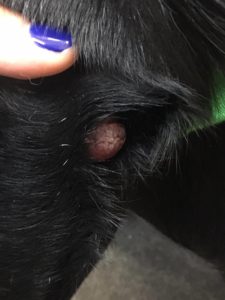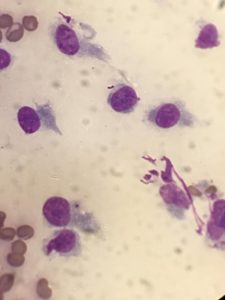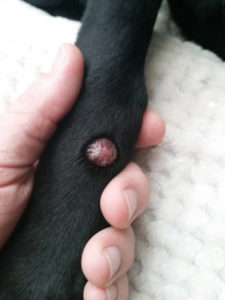Histiocytoma are a type of benign (non-cancerous) tumor that appears on the surface of the skin. They are more common in dogs than cats and are usually painless and self-healing.
Causes of Histiocytoma
The underlying cause of histiocytoma is unknown, but they originate in the Langerhans cells which form part of the immune system. Histiocytoma are most commonly seen in young dogs, and certain breeds such as boxers, bulldogs, and cocker spaniels appear to be more susceptible to the condition.
Symptoms of Histiocytoma
Histiocytoma have a button-like appearance and are typically small, red, raised, and hairless. They are usually solitary and often appear on the head, neck, ears, and limbs. In some cases, histiocytoma may become ulcerated or infected. If your pet develops tumors, it is important to visit your veterinarian as soon as possible to rule out the possibility that the growths are malignant (cancerous).
Diagnosis of Histiocytoma
Your veterinarian will assess your pet’s medical history and ask you a series of questions about the onset of their symptoms. They will also perform a complete physical examination and routine tests such as bloodwork and a urinalysis to evaluate your pet’s overall condition.
Microscopic analysis of affected tissue will be necessary to confirm or rule out a diagnosis of histiocytoma. Your veterinarian will obtain a sample of your pet’s tissue by performing a fine-needle aspiration or tissue biopsy. It is important to rule out malignant tumors before your pet undergoes treatment.
Treatment of Histiocytoma
Since Histiocytoma are often self-healing, your veterinarian may choose to carefully monitor your pet’s condition over the course of several follow up appointments.
Surgical removal of histiocytoma is also common, especially if tumors are affecting your pet’s quality of life. Growths are usually removed with a laser in a procedure known as cryosurgery. Following surgery, your veterinarian may prescribe antibiotics to fight infection and analgesics to relieve your pet’s pain. Please follow all treatment advice closely and administer medications as instructed to aid your pet’s recovery.
Prevention of Histiocytoma
Since the underlying cause of histiocytoma is not fully understood, there is no reliable way to prevent tumors in pets. Please visit your veterinarian if your pet develops growths. It is also important to schedule regular checkups to monitor your pet’s overall health.




